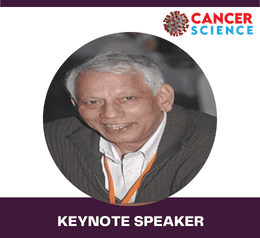Scholars World Congress on
Cancer Research and Oncology
THEME: "Frontiers in Cancer Research and Oncology"
 14-15 Nov 2022
14-15 Nov 2022  TIME Asma Hotel, Albarsha | Dubai, UAE & Online (Hybrid event)
TIME Asma Hotel, Albarsha | Dubai, UAE & Online (Hybrid event) THEME: "Frontiers in Cancer Research and Oncology"
 14-15 Nov 2022
14-15 Nov 2022  TIME Asma Hotel, Albarsha | Dubai, UAE & Online (Hybrid event)
TIME Asma Hotel, Albarsha | Dubai, UAE & Online (Hybrid event) 
Palindrome Liaisons Consultants, USA
Title: Growth inhibitory efficacy of natural products in cellular models for molecular subtypes of clinical breast cancer
Dr. Nitin T. TELANG is the Director, Cancer Prevention Research Program at Palindrome Liaisons Consultants, New Jersey. He earned his Ph.D. degree in India (1974), and obtained post-doctoral training at University of Nebraska, American Health Foundation, New York and Memorial Sloan-Kettering Cancer Center, New York (1976-1985). He has served as faculty member at Memorial Sloan-Kettering Cancer Center, Weill-Cornell Medical College, and Strang Cancer Prevention Center, New York (1986-2007). Dr. TELANG has published peer-reviewed papers in the areas of carcinogenesis, cancer prevention, and cancer stem cell biology. He has served on Grant Review Study Sections for National Cancer Institute (NCI) and US Department of Defense (DOD). He is on the editorial boards for Oncology Reports, International Journal of Oncology and World Academy of Sciences Journal. His research has been funded by grants from NCI and DOD. He has received NCI FIRST Award, DOD IDEA Award and AN Marquis Lifetime Achievement Award.
Background: Progression of early breast cancer to advanced stage metastatic disease represents a major cause of death in women. The mainstream therapeutic options are dependent on specific subtype and include conventional chemo-endocrine therapy and molecularly targeted therapy. Long-term therapeutic options are associated with spontaneous/acquired therapy resistance and emergence of chemo-resistant cancer initiating premalignant stem cell population that evolves in to metastatic phenotype. These limitations emphasize an unmet need to identify therapeutic alternatives against therapy resistance. Dietary natural products because of human consumption, lack of systemic toxicity and documented preclinical efficacy may represent testable therapeutic alternatives.
Experimental Evidence: Cellular models for molecular subtypes of clinical breast cancer exhibit hyper-proliferation and quantifiable risk for cancer development. Mechanistically distinct natural products exhibit anti-proliferative and pro-apoptotic effects and reduce cancer risk. The parental cell lines provide putative cancer stem cells. The development of stem cell models is quantified by drug-resistant progressive growth and upregulated expression of stem cell specific cellular and molecular markers. Effects of select natural products on stem cell models provide mechanistic leads for stem cell targeted inhibitory efficacy.
Conclusions: This presentation provides an overview of conceptual and technical aspects of model development and mechanistic leads for stem cell targeted efficacy of natural products. Collectively, the experimental evidence provides a scientifically robust rationale for future approaches on patient-derived clinical samples that reduces extrapolation of the data and enhance their clinical translatability.